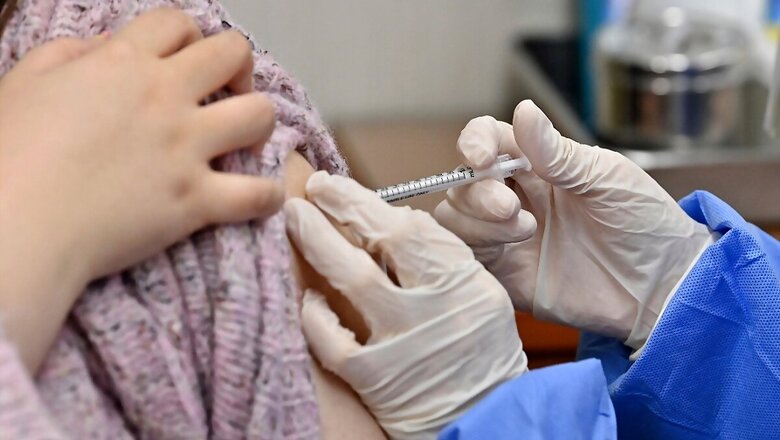
views
A total of about 13 million people in India, mostly in the 18-44 age group, registered for Covid-19 vaccines on Wednesday, though they would have to wait for a jab till the end of May or longer. But the number that should actually grab more attention is that on the same day, only about 2.2 million vaccinations of the eligible groups were carried out across the country, a nearly 50% drop from the record 4.3 million-plus vaccinations carried out on April 5.
The falling vaccination numbers, limited capacity of the two vaccine manufacturers who are now being piled upon with much bigger orders from state governments and private hospitals that may take months to fulfil, and private institutes stepping out of the vaccination picture from May 1 due to no supplies being committed to them are the big challenges plaguing the country’s expanded inoculation drive starting next month. All citizens over 18 will be eligible for Covid-19 vaccination from May 1. The registration process on the government’s CoWIN platform began on Wednesday.
News18 tried to decode the key questions and challenges afflicting this mammoth exercise.
Where are the stocks?
Serum Institute of India presently has a capacity of producing 70 million doses a month of Covishield, which it promises to increase to 100 million doses by June. Bharat Biotech has a present capacity of producing 10 million doses of Covaxin a month, which it has promised to double by May and make 60 million by July. This means India will have a stock of about 90 million vaccine doses each for the month of May and June. It is not known how many doses of Sputnik V would be available through import in May or if the US would send AstraZeneca stocks to help India out.
90 million doses a month would just be enough for the government’s current vaccination drive of the 45-plus age group as on an average about 3 million people have been vaccinated daily in April. The Centre would still need that many doses as the job of vaccinating the 45-plus age group still has a long way to go. Sample this: while over 100 million people of this category have got their first dose, only 13 million have got their second so far and the remaining 87 million will queue up in May and June for it. There are 450 million people in the 45-plus age category, showing that the task is far from done for this priority group which accounts for 80% of Covid mortalities.
Serum piled with orders from states
With states being told to procure their vaccines directly from suppliers for vaccinating the 18-45 age group from May 1, nearly 20 states have queued up with order requests at the Serum Institute of India and Bharat Biotech, going public with the quantum of their orders. A back-of-the envelope calculation shows that with each state asking for about 10-15 million doses, the order book has swelled to nearly 350 million doses already. These orders are mostly with the Serum Institute whose vaccine at Rs 300 for the states is half the price of the Rs 600 offered by Bharat Biotech.
“We don’t expect any supplies till June and Serum is still to give us a date too. Serum is already full to the brim with orders from the Centre and its monthly capacity of producing vaccines (70 million) is less than the total order of just one big state like Uttar Pradesh (UP) or Delhi,” an exasperated UP government official told News18. In fact, Serum has not even responded so far to the requests for orders from many states who are expected to face public pressure with over 13 million people of the 18-45 age group registering for vaccines already. “We don’t understand why registrations have been opened by the Centre when the vaccine stocks are not available. This is not a first-come-first-serve model anyway, so there is no point registering when appointments are not available. People will get impatient,” a Punjab official added.
Private hospitals step out
Private hospitals, as per the new policy, can neither vaccinate people of the 45-plus category at Rs 250 per dose from May 1 nor will they get any more vaccine supplies from the Centre. They have been told to procure their supplies exclusively from the vaccine suppliers from May 1. This would mean that 3,977 private vaccination sites operational in the country presently would cease to function from May 1 as they would not get any stocks immediately from the two suppliers for any of the age groups. People who got their first dose from a private hospital may well have to head to one of the 53,438 government vaccination centres for their second dose. This would only increase the pressure on government vaccination centres till private hospitals get stocks directly from suppliers and resume vaccination in June or even later as they will get the stocks after the states do.
Serum Institute on Wednesday asked one of Delhi’s biggest private vaccination centres, the Hamdard Institute, to wait for at least 5-6 months for supplies till the vaccine becomes available in the private market supply chain as “it is challenging to meet independently the requirement from large number of private hospitals, given our current obligation to meet the government’s existing requirements and to meet additional demand emanating from the states”. Private hospitals seeking import of vaccines have hit a wall too with global vaccine makers so far saying that they will deal only with the governments and not private entities.
Vaccination numbers falling
The falling vaccination numbers are a further cause of worry with the states blaming it on a lack of stocks from the Centre while the central government has stressed that the states still have nearly 11 million doses in their stock with 2 million more en route. The lockdowns in various states have slowed the vaccination drive with people hesitating to step out given the rampaging second wave of the pandemic. The fall in vaccination numbers is stark in the worst-affected states like Delhi where the exercise should have been done in mission mode given the exponential rise in cases.
These challenges are only expected to escalate from May 1. Further, the stipulation that no walk-ins will be allowed for the 18-44 age group is contrary to the experience so far, where over 9 crore people out of the 15 crore who have got vaccinated in the 45-plus category were walk-ins. Though the idea is to stop crowding and, hence, insist on only registration-based online appointments for the 18-45 category, the stipulation may impact vaccinations in the rural sector.
Read all the Latest News, Breaking News and Coronavirus News here. Follow us on Facebook, Twitter and Telegram.




















Comments
0 comment